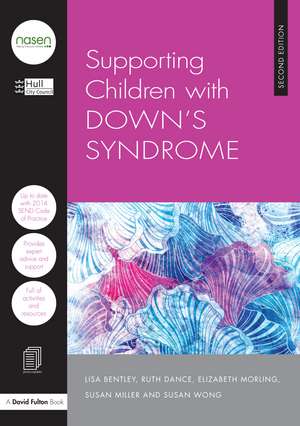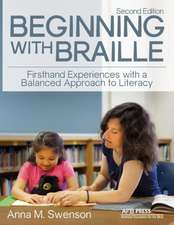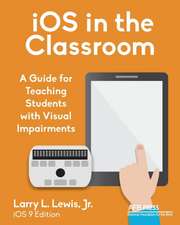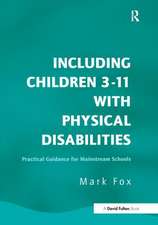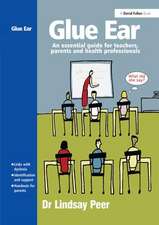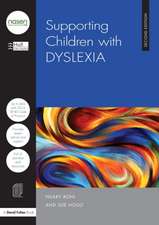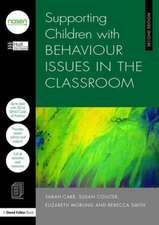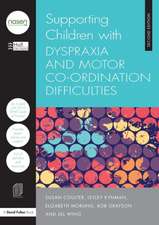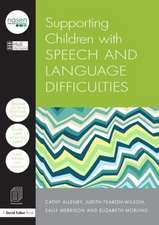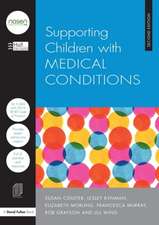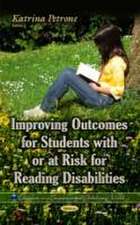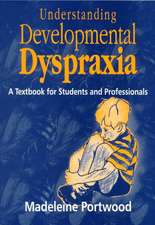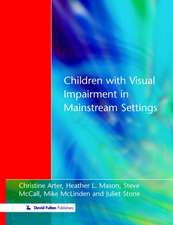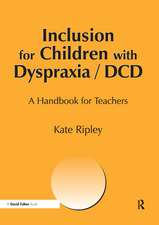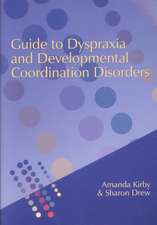Supporting Children with Down's Syndrome: nasen spotlight
Autor Hull City Councilen Limba Engleză Paperback – 20 aug 2015
The wide-ranging chapters explore a variety of topics, including:
- Defining the profile of a pupil with Down’s Syndrome
- Guidelines for working with pupils
- Addressing behaviour issues
- The use of ICT
- Home/school liason
- Assessment
Din seria nasen spotlight
-
 Preț: 279.85 lei
Preț: 279.85 lei -
 Preț: 246.20 lei
Preț: 246.20 lei -
 Preț: 251.04 lei
Preț: 251.04 lei -
 Preț: 193.13 lei
Preț: 193.13 lei -
 Preț: 264.05 lei
Preț: 264.05 lei -
 Preț: 314.64 lei
Preț: 314.64 lei -
 Preț: 192.36 lei
Preț: 192.36 lei -
 Preț: 194.46 lei
Preț: 194.46 lei -
 Preț: 193.61 lei
Preț: 193.61 lei -
 Preț: 221.35 lei
Preț: 221.35 lei -
 Preț: 193.20 lei
Preț: 193.20 lei -
 Preț: 191.18 lei
Preț: 191.18 lei -
 Preț: 205.94 lei
Preț: 205.94 lei -
 Preț: 191.73 lei
Preț: 191.73 lei -
 Preț: 256.29 lei
Preț: 256.29 lei -
 Preț: 191.30 lei
Preț: 191.30 lei -
 Preț: 223.76 lei
Preț: 223.76 lei -
 Preț: 281.38 lei
Preț: 281.38 lei -
 Preț: 192.14 lei
Preț: 192.14 lei -
 Preț: 248.06 lei
Preț: 248.06 lei - 5%
 Preț: 204.05 lei
Preț: 204.05 lei -
 Preț: 222.08 lei
Preț: 222.08 lei -
 Preț: 214.49 lei
Preț: 214.49 lei -
 Preț: 191.28 lei
Preț: 191.28 lei - 5%
 Preț: 197.79 lei
Preț: 197.79 lei -
 Preț: 191.69 lei
Preț: 191.69 lei -
 Preț: 301.05 lei
Preț: 301.05 lei -
 Preț: 450.03 lei
Preț: 450.03 lei -
 Preț: 230.87 lei
Preț: 230.87 lei - 18%
 Preț: 180.81 lei
Preț: 180.81 lei - 24%
 Preț: 207.61 lei
Preț: 207.61 lei - 26%
 Preț: 765.43 lei
Preț: 765.43 lei -
 Preț: 308.76 lei
Preț: 308.76 lei - 18%
 Preț: 173.81 lei
Preț: 173.81 lei -
 Preț: 304.51 lei
Preț: 304.51 lei -
 Preț: 168.58 lei
Preț: 168.58 lei - 18%
 Preț: 895.29 lei
Preț: 895.29 lei - 34%
 Preț: 764.20 lei
Preț: 764.20 lei - 26%
 Preț: 735.42 lei
Preț: 735.42 lei - 49%
 Preț: 177.15 lei
Preț: 177.15 lei
Preț: 191.76 lei
Nou
Puncte Express: 288
Preț estimativ în valută:
36.69€ • 38.41$ • 30.54£
36.69€ • 38.41$ • 30.54£
Carte disponibilă
Livrare economică 10-24 martie
Livrare express 21-27 februarie pentru 22.22 lei
Preluare comenzi: 021 569.72.76
Specificații
ISBN-13: 9781138914858
ISBN-10: 1138914851
Pagini: 116
Ilustrații: 15 black & white tables, 2 black & white line drawings
Dimensiuni: 210 x 297 x 8 mm
Greutate: 0.32 kg
Ediția:Revised
Editura: Taylor & Francis
Colecția David Fulton Publishers
Seria nasen spotlight
Locul publicării:Oxford, United Kingdom
ISBN-10: 1138914851
Pagini: 116
Ilustrații: 15 black & white tables, 2 black & white line drawings
Dimensiuni: 210 x 297 x 8 mm
Greutate: 0.32 kg
Ediția:Revised
Editura: Taylor & Francis
Colecția David Fulton Publishers
Seria nasen spotlight
Locul publicării:Oxford, United Kingdom
Public țintă
Academic, Professional, and Professional Practice & DevelopmentCuprins
Foreword Section 1: Introduction: What is inclusion? 1. Inclusion in education 2. The Legislation 3. Including the pupil with Down’s syndrome 4. The specific learning profile for Down’s syndrome Section 2: Including the Pupil with Down’s Syndrome 5. Characteristics 6. Possible medical problems 7. Supporting pupils with Down’s syndrome 8. Classroom practice 9. Differentiation 10. Visual impairment 11. Hearing impairment 12. Transition from primary to secondary school Section 3: Use of Support Staff for the pupil with Down’s syndrome 13. Adult support for the pupil 14. Support staff: effective deployment 15. Support staff: roles and responsibilities 16. Support staff: guidelines for working with pupils Section 4: Specific Issues in Teaching and Learning for the pupil with Down’s syndrome 17. Developing speech and language 18. Addressing behaviour issues 19. Developing memory 20. Developing mathematical skills 21. Developing reading skills 22. Developing independent writing 23. Teaching spelling 24. Fine and gross motor skills 25. The use of ICT Section 5: Developing Social Inclusion for the pupil with Down’s syndrome 26. Independence skills 27. Developing self-help skills 28. Developing self-esteem 29. Supporting peers to include pupils with Down’s syndrome 30. Promoting peer-group relationships 31. Pupil’s views 32. Home/school liaison 33. The emotional aspects of life with a child Down’s syndrome 34. Siblings of the child with Down’s syndrome Section 6: Assessment and planning 35. Assessment 36. Pupil profiles and learning plans/IEP’s Section 7: Continuing Professional Development 37. Planning for Continuing Professional Development Section 8: Resources and useful contacts Resources Useful contacts Appendix 1: Issues for consideration Appendix 2: Some professionals who may be involved with the pupil Appendix 3: Small steps approach to recording progress in reading Appendix 4: Small steps approach to recording progress in scissor skills
Descriere
This practical resource contains a wealth of valuable advice and tried-and-tested strategies for identifying children and young people with Down’s Syndrome. Fully updated with the 2014 SEND Code of Practice, this text describes the different types of difficulties experienced by pupils with Down’s Syndrome and helps practitioners to understand their diverse needs. It provides guidance and practical strategies for teachers and other professionals, helping them to feel more confident, and be more effective in supporting learners in a variety of settings. It also provides materials for in-house training sessions, and features useful checklists, templates and photocopiable/downloadable resources.
